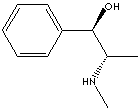| CAS
NO. |
299-42-3
|

|
| EINECS
NO. |
206-080-5 |
| FORMULA |
C6H5CH[CH(NHCH3)CH3]OH |
| MOL
WT. |
165.23 |
|
H.S.
CODE
|
|
|
TOXICITY
|
|
| SYNONYMS |
L-(-)-Ephedrine; Efedrina;
(1R,2S)-(-)-Ephedrine; |
|
(-)-2-Methylamino-1-phenyl-propane-1-ol;
alpha-[1-(methylamino)ethyl]benzyl alcohol; [R-(R',S')]
alpha-[1-(methylamino)ethyl] Benzenemethanol; L-alpha-(1-Methylaminoethyl)benzyl alcohol; (1R,2S)-2-Methylamino-1-phenyl-1-propanol;
|
| DERIVATION |
|
CLASSIFICATION
|
|
|
PHYSICAL
AND CHEMICAL PROPERTIES
|
| PHYSICAL
STATE |
Clear to pale yellow viscous liquid |
| MELTING
POINT |
36
C |
| BOILING
POINT |
|
| SPECIFIC
GRAVITY |
|
| SOLUBILITY
IN WATER |
Soluble
(soluble in alcohol) |
| pH |
4.5
- 6 |
| VAPOR
DENSITY |
|
| AUTOIGNITION |
|
| NFPA
RATINGS |
|
|
REFRACTIVE
INDEX
|
|
| FLASH
POINT |
|
| STABILITY |
Stable
under ordinary conditions. |
|
GENERAL
DESCRIPTION & APPLICATIONS
|
| Ephedrine is a sympathomimetic alkaloid originally obtained from species of
Ephedra or prepared synthetically. Its action is similar to that of epinephrine
(a catecholamine hormone secreted by the adrenal medulla and a
neurotransmitter). Its effects, although less powerful, are more prolonged, and
it exerts action when administered orally, whereas epinephrine is effective only
by injection. It is used as muscle relaxants, central nervous system and cardiac
muscle stimulants in combination with others like theophylline. It is used to
prevent hypotension during spinal and infiltration anesthesia; and as a
mydriatic. There are enantiomers in ephedrine structure. (1R,2S)- and
(1S,2R)-enantiomers are designated ephedrine (opposite stereoisomerisms around
the chiral center), whereas (1R,2R)- and (1S,2S)-enantiomers are designated
pseudoephedrine. Commercial ephedrine is (-)-(1R,2S)-ephedrine [also called
(-)-Ephedrine or L-ephedrine], while commercial pseudoephedrine enantiomer is
(1S,2S)-pseudoephedrine [(+)-pseudoephedrine or D-pseudoephedrine].
Pseudoephedrine has less pressor action and fewer central stimulant effects than
ephedrine. Pseudoephedrine is used as a nasal decongestant and a bronchodilator
to relaxe and open the air passages to the lung to increase the flow of air, and
thus is used in the treatment and/or prevention of symptoms of bronchial asthma
and of reversible bronchospasm associated with chronic bronchitis and emphysema.
|
| SALES
SPECIFICATION |
|
APPEARANCE
|
Clear to pale yellow viscous liquid |
|
IDENTIFICATION
|
passes
test A,B
|
| ASSAY |
99.0.%
- 101.0%
|
|
RELATED
SUBSTANCE
|
0.5%
max
|
|
OPTICAL
ROTATION
|
-40.3°
~ -43.3° (C=2.5% in 0.6N HCL)
|
|
SOLVENT
RESIDUE
|
2500ppm max (Diisopropyl ether) |
|
HEAVY
METALS
|
20ppm
max
|
|
WATER
|
0.5%
max
|
| CHLORIDE |
5ppm
max
|
| TRANSPORTATION |
| PACKING |
|
| HAZARD
CLASS |
|
| UN
NO. |
|
| OTHER
INFORMATION |
|
Hazard Symbols: XN, Risk Phrases: 22, Safety Phrases: 22-23 |
